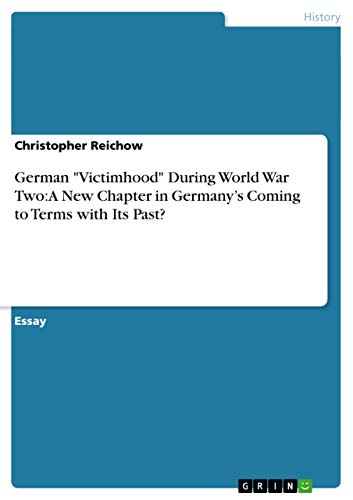Verwandte Artikel zu German "Victimhood" During World War Two: A...
German "Victimhood" During World War Two: A New Chapter in Germany's Coming to Terms with Its Past? - Softcover

Zu dieser ISBN ist aktuell kein Angebot verfügbar.
Alle Exemplare der Ausgabe mit dieser ISBN anzeigen:„Über diesen Titel“ kann sich auf eine andere Ausgabe dieses Titels beziehen.
- VerlagGRIN Publishing
- Erscheinungsdatum2014
- ISBN 10 3656653461
- ISBN 13 9783656653462
- EinbandTapa blanda
- Auflage1
- Anzahl der Seiten18
Neu kaufen
Mehr zu diesem Angebot erfahren
Versand:
EUR 32,99
Von Deutschland nach USA
Beste Suchergebnisse beim ZVAB
German "Victimhood" During World War Two: A New Chapter in Germany¿s Coming to Terms with Its Past?
Buchbeschreibung Taschenbuch. Zustand: Neu. Druck auf Anfrage Neuware - Printed after ordering - Essay from the year 2013 in the subject History Europe - Germany - National Socialism, World War II, grade: 1,0, Diplomatic Academy of Vienna - School of International Studies, language: English, abstract: The Second World War and its historical categorization remains a disputed topic within the German society. Still, the way of how Germans are rethinking their history is in a state of flux. While the question of collective and individual German guilt has attracted increased scientific and popular attention since the late 1960s, more precisely after the Eichmann and Auschwitz trials, German intellectuals and the German media have in recent years turned their attention, again, towards German suffering during the war. This can be seen as a recourse within a new framework. Already in the immediate postwar period, Germans depicted themselves as victims of the war and its settlement. The preferred self-image was that of being first a victim of Hitler's and then of enemies hands. Once again, though very late, Germans today consider their own countrymen as victims. In movies and books, they depict themselves and their ancestors not only as villains, but also as people who endured air bombing, starvation, and expulsion. This revived way of storytelling began around the new millennium and focused espe-cially on Germany's civilian population. An important stimulus for Germany's coming to terms with its past, or Vergangenheitsbewältigung, was once again triggered by Günter Grass, born in 1927 in Danzig, one of the country's most popular and successful authors. Already as a member of the famous Group 47, he had - inter alia - initiated a new concept to rejuvenate German literature, particularly with his book The Tin Drum. He also contested a denial of civic responsibility and guilt in past and present, which he saw occurring in the consumerist-driven Bonn Republic. His first two books written in the new millennium, the novel Crab-walk, published in 2002, and his autobiographic work Peeling the Onion, released in 2006, were widely analyzed and sparked off a heated debate on both German guilt and German suffering. By using both books as a case study, this essay examines the main issues that were addressed by Grass and points out today's situation of German Vergangenheitsbewältigung. Artikel-Nr. 9783656653462
Weitere Informationen zu diesem Verkäufer | Verkäufer kontaktieren

